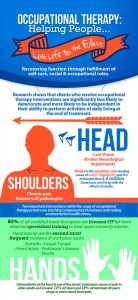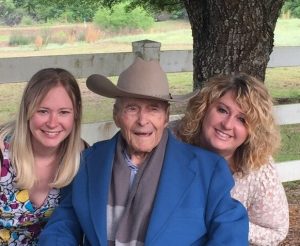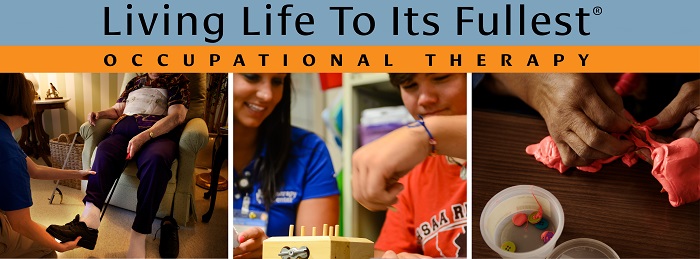Throughout the month of April, we recognize our occupational therapists and occupational therapy assistants as a part of Occupational Therapy Month.
What is occupational therapy?
Occupational therapist or occupational therapy assistants help people across the lifespan participate in the things they want and need to do through the therapeutic use of everyday activities. They use a holistic and customized approach to evaluations, interventions, and outcomes help a child with disabilities participate in school and in social situations, assist a person recovering from injuries to regain skills, aid an older  adult to stay as independent as possible, and offer the specialized support and services to people of all ages and in all circumstances that only occupational therapy can provide.
adult to stay as independent as possible, and offer the specialized support and services to people of all ages and in all circumstances that only occupational therapy can provide.
Did you know?
Occupational therapy helps people live life to the fullest. From environmental modifications to education on proper dressing, sleeping, or sitting techniques, OTs can help people make the adjustments needed to heal and return to many of the activities of daily living that they enjoyed prior to injury. View our infographic to learn how occupational therapists can help with upper body and lower body pain and injury.
What a career in occupational therapy means
We asked Therapy Center’s Director of Education and occupational therapist, Danielle Keyser for a snapshot of what a life in occupational therapy has meant to her and what important things has she learned along the way.
“I am very blessed to be an occupational therapist. I began practicing in skilled nursing facilities in 2001, and very quickly identified the geriatric population as my passion, and skilled nursing as a place to establish a purposeful career. The ultimate achievement of our profession, to be the facilitators and guardians of quality of life, allows us to know our patients with an intimacy that is truly unique to OT.
 In 2012, I began an endeavor to advance my clinical skills, ultimately achieving my Geriatric Training Certification (GTC), which consisted of a foundational requirement of 160 hours of geriatric specific training. Education is a crucial ingredient in keeping our practice up to date, inspired, and skilled enough to meet the needs of a challenging patient population. I also made the decision to commit a portion of my time to increase my involvement in the Louisiana Occupational Therapy Association, initially serving as Vice President and now as President of the Association.
In 2012, I began an endeavor to advance my clinical skills, ultimately achieving my Geriatric Training Certification (GTC), which consisted of a foundational requirement of 160 hours of geriatric specific training. Education is a crucial ingredient in keeping our practice up to date, inspired, and skilled enough to meet the needs of a challenging patient population. I also made the decision to commit a portion of my time to increase my involvement in the Louisiana Occupational Therapy Association, initially serving as Vice President and now as President of the Association.
I implore ALL clinicians to embrace the fact that staying involved, with active membership at minimum, with State and National Associations IS the PROFESSIONAL RESPONSIBILTY of every clinician. The cost of Association membership is a very small commitment when you consider the annual salary of a OT/OTA. As OT celebrates the centennial anniversary of our profession, and as we wind down the highlight of OT in the month of April, let’s take the time to: personally commit to ensuring the quality of services we deliver, commit to ongoing growth of personal knowledge and resources to impact and improve our practice, and check your association membership status and make sure it is active.
I am inspired by the team of clinicians that I am blessed to work with. Thank you for loving our patients, thank you for challenging yourselves to meet the needs of the geriatric population, and thank you for allowing me to be a part of The Therapy Center Family.”- Danielle
Help celebrate and get involved.
Occupational therapy has helped people return to valued occupations for the past 100 years. 2017 marks the centennial celebration of this wonderful profession.
See videos and stories about how occupational therapy has impacted lives.
Share how OT is celebrating the centennial in your state!
Join LOTA and subscribe to the quarterly newsletter.
Join AOTA.
Look for career opportunities!

